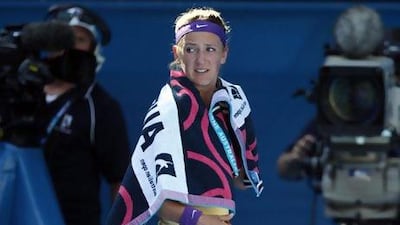MELBOURNE // Was it gamesmanship or a genuine misunderstanding?
The murky issue of cheating reared its ugly head at the Australian Open yesterday as world No 1 Victoria Azarenka took a controversial timeout on the verge of her semi-final victory against American teenager Sloane Stephens.
Leading by a set and 5-4, the champion had just missed five match points when she took a 10-minute timeout, leaving her teenage opponent to sit and wait.
When she returned, the Belarusian broke Stephens to clinch a 6-1, 6-4 victory and a place in the final. As jeers rang out around Rod Laver Arena, Azarenka compounded matters by making a bizarre courtside speech.
"I almost did the choke of the year," she said. "At 5-3 I had so many chances but I couldn't close it out. I felt a little bit overwhelmed that I was close to another final."
Pam Shriver, former world No 2, tweeted shortly afterwards: "A terrible call in Kim [Clijsters]-Justine [Henin] final [in 2004] here helped usher in the challenge system. Now this injury charade of 10 minutes may change injury rule."
Azarenka told a news conference that she had required the timeout because of a "locked rib" that made it difficult to breathe. "I had been struggling ... in the second set [with] my back," she said.
"And it just kept getting worse. I should have called the trainer a little bit earlier before [but] when I got to the point that I couldn't really breathe and had to go off court."
Under the rules, a player requesting treatment is evaluated and if they have developed "a treatable medical condition" they can receive a three-minute timeout.
Though Azarenka had to leave the court for the treatment, the total break was closer to 10 minutes.
It is not the first time players have pushed the boundaries of what is acceptable.
At the US Open in 2005, Mary Pierce took a 12-minute break for two simultaneous injuries in her semi-final with Elena Dementieva.
Russia's Dementieva had taken the first set with ease but when Pierce took a lengthy timeout, her rhythm was destroyed and the Frenchwoman recovered for victory. At the time, officials were blamed for not enforcing the rules more strictly.
In another interview with ESPN immediately after the match, Azarenka described it as a "panic attack".
Azarenka tried to explain away her on-court comments as a misunderstanding, saying she thought she had been asked why she could not close out the match, rather than what had happened with her timeout.
"I understand the whole situation right now but it just really was simple misunderstanding of a question," she said. "I guess it was my bad.
"I should have called the trainer a little bit earlier, before I got to the point that I couldn't really breathe and had to go off court."
The incident was in stark contrast to the quarter-final between Stephens and Serena Williams on Wednesday, when Williams had suffered a back injury but took a quick timeout and then refused to blame it for her surprise defeat.
"When you cannot breathe you start to panic," Azarenka said. "I was really panicking [but] not because I couldn't convert my match points. What can I do? Is it my fault the doctor took that long to evaluate? I said, 'I don't want two medical timeouts. I only took one'."
The official scorecard for the match said that Azarenka had taken two medical timeouts.
Follow us

